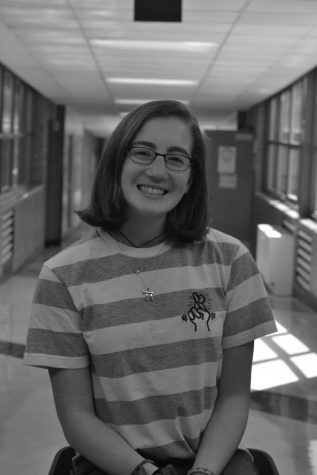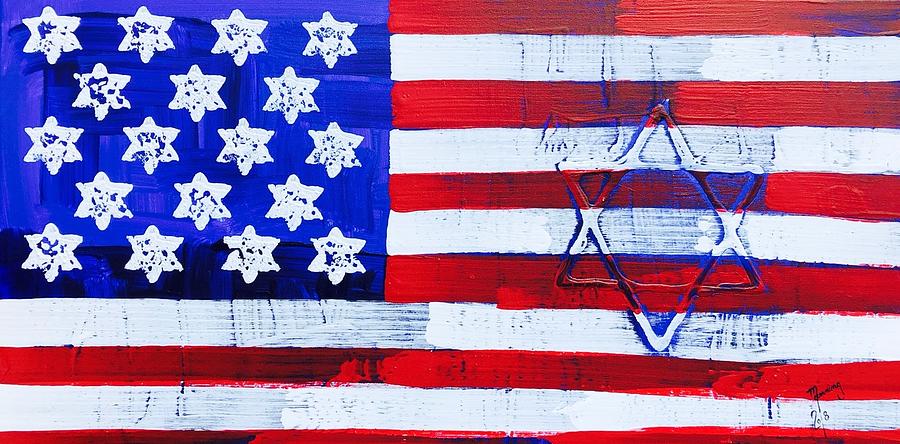Americanized: Jew First
“What is your background? Where are you from?” “First of all, I am a Jew”: A search for identity. Our next piece in the “Americanized” series.
A painting of Stars of David embedded in the American Flag.
Let’s get one thing straight right off the bat. I am (at least) a third generation American. A third generation Pittsburgher, actually. I don’t know much about my father’s side of the family other than they came from Romania, but on my mom’s side, my great- and great-great grandfathers came over to America from Seirijai, Lithuania in 1910. My great-grandfather and namesake, Jerome Sedler (Yerucham Sidor), was twelve years old, traveling to Pittsburgh with his father, Chatzkel. The day they were supposed to return to Lithuania, Chatzkel died, leaving Yerucham stranded in Pittsburgh with his half-brother, and that’s where he stayed. That story in and of itself is fascinating, but that’s not why I am writing right now. This is about me.
I am white. I am virtually 100% Eastern European. I am Jewish. I am an American. Everyone who has written pieces for our “Americanized” series has such interesting personal stories and backgrounds, most of whom hail from different countries themselves. My family has been here for over 100 years. So why am I writing something for this series, you may ask?
I have been trying to find my Jewish identity my whole life. I’m not a very religious person; I identify more culturally with Judaism than religiously. I went to preschool at my synagogue, so that’s really where my Jewish life began. My family has been members of Temple Ohav Shalom for almost 20 years. There I went to Sunday school beginning in kindergarten and Hebrew school beginning in third grade, both up until seventh grade. The main purpose of Hebrew school was to prepare you to read from the Torah for your bar or bat mitzvah, not learn conversational and conventional Hebrew, and Sunday school was really just learning about the stories of the Torah. Neither Sunday nor Hebrew school really did anything to further my search for my Jewish identity. I never felt connected to what I was learning. This was also not the place where I decided if I believed in God or not, a sometimes crucial component to some people’s Jewish identities. After my bat mitzvah in seventh grade, I stopped going to both Sunday school and Hebrew school.
I never continued to learn Hebrew past then, except with a pitiful attempt on DuoLingo. I really wish I did. This summer, I plan to travel to Israel. It sure would be helpful to know some Hebrew there, although schools in Israel teach in Hebrew and English from an early age, as do many countries around the world. That was one thing that always bugged me about our school, and many other schools across America. At North Allegheny, we don’t start learning languages until seventh grade. Why not start earlier? Why is language no longer a requirement past a certain year?
So many countries around the world begin teaching their native language as well as English from the time kids start attending school. I believe learning languages is one of the most beneficial skills you can learn in school, and in general. You can communicate with a much, much wider array of people across the globe when you learn a second language.
Some of my friends can speak Hebrew, and I have always been envious of that. Hebrew is the language of my people, and I regret not taking my education further. Although it’s never too late, of course, for anyone. Learning languages not only improves your cognitive abilities, but also your cultural and global awareness. You learn to become more inclusive and caring. You gain respect for other cultures. Teaching about other cultures teaches kindness. Thankfully, despite it being very limited, my knowledge of Hebrew has broadened my horizons and views on my religion around the world. Judaism is often considered a cultural or ethnic religion because of the history, tradition, stories, and language associated with it.
Those cultural and traditional aspects gave me a strong connection to something bigger than myself. I identify strongly with being Jewish over being American. When asked about my nationality or background, I always say that I am Jewish first. No matter what. I did not choose to be born into this religion and culture, but I am so glad I was. The choices I make based on what I was given have impacted my identity. I chose to get involved in my Jewish community.
I chose to join BBYO, an international Jewish teen movement. This has helped me start to solidify some components of my Jewish identity. In mid-February, I attended BBYO’s International Convention in Dallas, Texas. That was the largest gathering of Jewish teens of which I have ever been a part. I met so many Jewish teens from across the globe; from Mexico to Cambodia and beyond. In fact, I had a whole conversation in Spanish with a girl from Argentina. For some, meeting international people would make people feel more proud of their American roots; when meeting people they get to tell them about America. For me, it just made me more proud of my Judaism. I barely talked about what America is like when meeting people from other countries. I was more interested in where they were from. After all, they were in America (probably one of the most stereotypical American cities in the country). For those five days, I was not connected to my Americanism, but rather to my Judaism because that was what I had in common with the other five thousand teens that were there. That’s what we were there for. To strengthen and validate our own individual identities as well as our identity as a people; to come together as one united front, no matter what country we came from.
Originally, my mother said that she tends to view herself as American before Jewish. I am the opposite. I will always identify with Judaism first. That is what I believe in, and that’s what I feel strongly connected to. Judaism is still of course incredibly important to my mom. I asked her why, then, she said American first, to which her response was: “It’s funny–I’ve been thinking about that a lot. I might change my answer, because I posed these scenarios to myself: If someone said to me, you have to give up your American citizenship to stay Jewish, I would. But if someone said I had to give up my Judaism to keep my American citizenship, I would not. That being said, if I couldn’t set foot in America ever again, I’d be devastated. But I can’t imagine me without my Jewish identity either.”
“Interestingly, being American affords me more privileges than being Jewish does,” she continued. “No one ‘discriminates’ against Americans [at least in America, I added]. But plenty of people discriminate against Jews, in this country and globally. It would be easier, wouldn’t it, to choose being an American? But because of the struggle of my people for centuries, I feel like if I chose my country over my culture/religion/people, I would be disregarding, and disrespecting, my history.”
I agree completely. America is not always my favorite place. I have not yet been to Israel, but I dream of being there sometimes instead of here. I am incredibly lucky for my community, though. Where I was born and where I live is a very safe place. I’m grateful for America, don’t get me wrong. However, there are many other Americans in this country who cannot say the same thing. And that’s why I don’t think this country is fair. “Liberty and Justice for All” means nothing to me if I see people struggling in this country.
I don’t stand for the Pledge of Allegiance. But I always stand for the Mourner’s Kaddish*. I will not stand for things I do not believe in. Why would I pledge my allegiance to a country that does not give equal opportunity to everyone? Where injustice ravages everywhere you look? I’m not trying to be political, but the reason I put American second stems from how this country operates. My Jewish identity stems from thousands of years of history, tradition, and family.
I am a lot of things. I am still American, no matter where I live or go. But no matter what, I am a Jew first. I will forever and always be proud of that.
*The Mourner’s Kaddish is the prayer for the recently deceased. It is optional to stand based on your custom. I was never taught that in synagogue, but at BBYO conventions or other mixed-sect services, I heard that some people stand. I decided to stand too.

Jess is a sophomore at NAI. This is her first year as an official member of the NAEye staff, though she had published things last year. Jess's passions...



Evan W. Wolfson • Nov 19, 2020 at 11:16 pm
I have information of the family of Jeruchim Sedler (Sidor) and his father Hatzkel, showing different branches of the same family coming to Pittsburgh and other cities and taking different surnames. Perhaps it is of interest. Good article!
Marissa Granite • Mar 17, 2020 at 2:51 pm
Great, as always, J!!:)